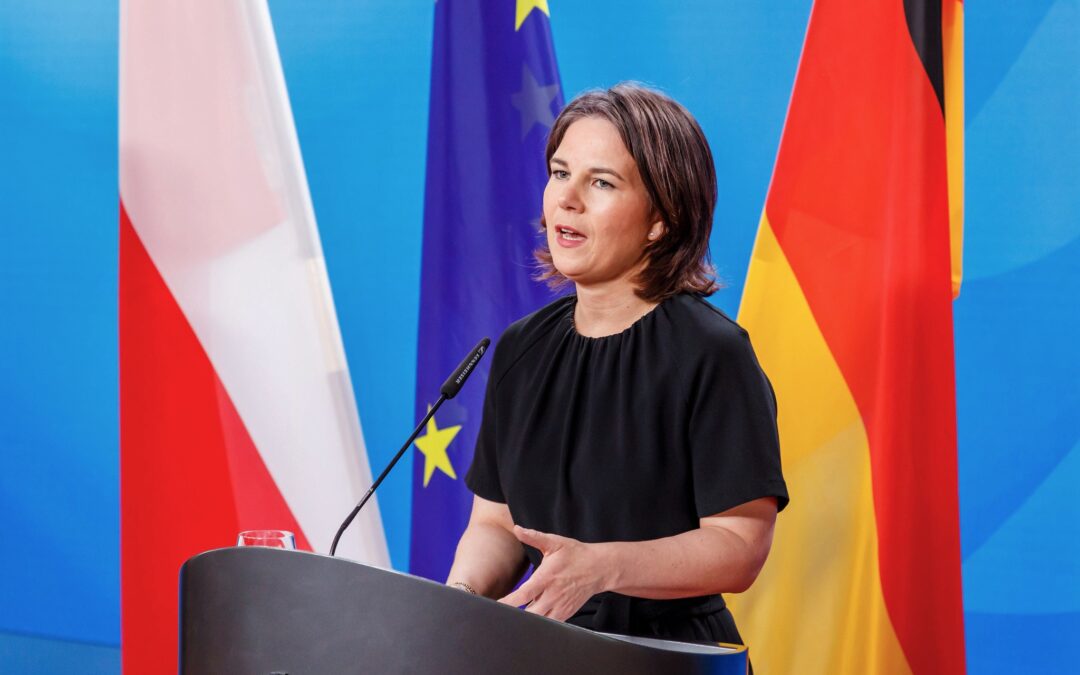Germany’s foreign minister has, on a visit to Warsaw, reiterated Berlin’s longstanding position that the issue of war reparations is “closed”, despite renewed efforts by the Polish government to obtain them.
Annalena Baerbock and her Polish counterpart Zbigniew Rau did, however, both express support for Ukraine following talks focused on security issues. But Rau added that Russia’s aggression there simply adds to the importance of Poland and Germany setting an “example” by reaching a settlement on reparations.
W siedzibie MSZ odbyło się dziś spotkanie min. @RauZbigniew z min. SZ Niemiec 🇩🇪 @ABaerbock, która przebywa z wizytą w Warszawie. pic.twitter.com/TV2c61yVB8
— Ministerstwo Spraw Zagranicznych RP 🇵🇱 (@MSZ_RP) October 4, 2022
Ahead of Baerbock’s visit, Rau yesterday signed a diplomatic note officially informing Germany of Poland’s intention to seek war reparations. The Polish ruling Law and Justice (PiS) party last month suggested that it could seek up to $1.3 trillion to compensate for losses caused during World War Two.
However, speaking alongside Rau today, Baerbock told the press that, while “Germany admits its historical responsibility, no ifs or buts about it, the issue of reparations is a closed one from the perspective of the German government”.
Germany argues that Poland’s communist government officially renounced the country’s claim to reparations in the 1950s. However, PiS rejects that claim, saying that no legally binding commitment was made and the reparations are still due.
Baerbock acknowledged today that the “suffering [of the war] is passed down from generation to generation” and that Germans “may not always be aware of that”. She stressed the need to keep that memory alive, saying that it is an issue Poland and Germany “can and have to work on jointly”.
The Geman foreign minister “thanked Poles [for the fact] that, despite our crimes, we can build a common, better future in Europe”.
By contrast, Rau warned that the “negative consequences of the German occupation for [Poland’s] social capital, economic potential and national heritage limit and inhibit the possibilities of further developing and deepening Polish-German relations”, reports news website Interia.
Poland has issued a diplomatic note seeking war reparations from Germany, which it has said could amount to $1.3 trillion.
"A settlement will allow relations to be based on justice and truth and will close painful chapters," says the foreign minister https://t.co/afHeD8d2RQ
— Notes from Poland 🇵🇱 (@notesfrompoland) October 3, 2022
He also drew parallels to Russia’s current war in Ukraine, noting that Poland and Germany have “dramatically different experiences…of the traumas caused by imperial policies, territorial and material plunder, attempts to colonise and exterminate entire nations”.
But this offers an opportunity, he noted. By reaching a settlement on reparations, Poland and Germany can “create a model example of overcoming the consequences of illegal use of violence in international relations…[An] unequivocal and common position of Poland and Germany in this matter has great political significance”.
Following their meeting, Rau also reported that Germany and Poland agree on the importance of providing Ukraine with the resources to defend itself from Russian aggression.
“Poland and Germany jointly condemn Russia for the unprovoked and unjustified use of force against Ukraine” and for “organising fake referendums in the occupied territories”, he said, quoted by news website wPolityce.
“We also agree that the war must end with Ukraine regaining full territorial integrity, bringing the perpetrators of war crimes to justice, and the payment of war reparations and indemnities by Russia,” Rau added.
Speaking in Warsaw ahead of her meeting with Rau, Baerbock had assured Poland and other countries of the region that Germany “will be with you” in the face of Russian aggression. “The security of Eastern Europe is the security of Germany,” she added, quoted by TVP.
Main image credit: Sebastian Indra/MSZ (under CC BY-NC 2.0)

Daniel Tilles is editor-in-chief of Notes from Poland. He has written on Polish affairs for a wide range of publications, including Foreign Policy, POLITICO Europe, EUobserver and Dziennik Gazeta Prawna.




















